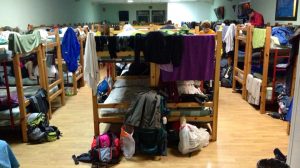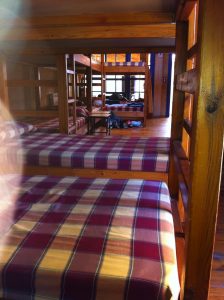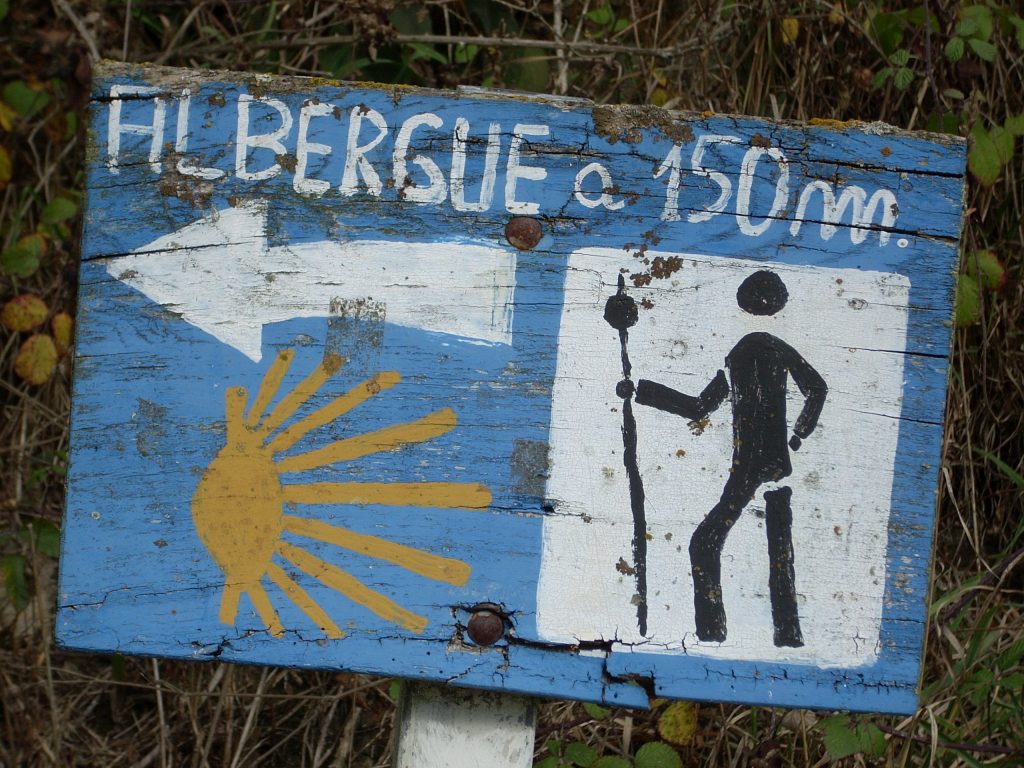Early in my Camino podcasting career I did an episode on Sleeping on the Camino. I talked about all the different types of accommodation options on the Camino, what they are like, and about how much they cost.
In other episodes I have shared my belief that where you sleep doesn’t determine if you are or are not a “true” pilgrim. I have also suggested that it is completely possible to have an authentic pilgrim experience regardless of where you sleep – albergues or hotels, in a Casa Rural or Pensión, in an hostal or in an apartment you found on Airbnb.
I have stayed in many albergues over the years, and I have had some wonderful experience. There is nothing like the warmth of genuine hospitality delivered by a compassionate hospitalero after a difficult day on the trail. And to come together with fellow pilgrims to share a meal over stories from the Road and home – there’s nothing like it.
I have also lost a lot of sleep by staying in albergues.

My unscientific estimate is that roughly 70% of pilgrims are okay staying in the albergues, and many of those actually prefer the community environment of the albergues. That leaves about 30% of pilgrims for whom sleeping in the albergues just isn’t their thing.
But why is that?
I know my reasons for staying in private rooms. But you know what? It took me years to get to the point where I felt like I could go against the albergue flow and honor my needs for privacy and overnight quiet. The this is where pilgrims stay tide was that strong. And like many pilgrims, I longed to connect with others and to be part of this global community.
For me, though, sleeping in shared dorms just doesn’t do it.
The other day I sat down and brainstormed all the reasons I could think of for why someone would choose to stay in a private room while on pilgrimage to Santiago de Compostela. And to be fair, I did the same for why people would choose to stay in the albergues.
Let’s look at my lists, starting with why people choose to stay in the albergues.
Why pilgrims stay in the albergues
- Because in their experience, that’s where people stay when they travel.
- Because they heard or read that that’s where pilgrims stay.
- They heard or read that albergues are the heart of the pilgrim community.
- They love the idea of hanging out with pilgrims at the end of the day, cooking and eating together, and they find that energizing.
- They need access to a kitchen to prepare meals.
- They are on a small budget.
- They are attracted to the simplicity of staying at an albergue.
- They are comfortable sharing sleeping and bathroom space with both men and women.
- They sleep easily just about anywhere.
- They aren’t bothered by snoring or other noises.
- They are used to sharing space with others – siblings, partners, children
- They want the experience that albergues provide.
- Their comfort needs are easily met with a bed and a (hopefully hot) shower.
- They don’t need privacy where they sleep or in the bathroom.
- They are physically able to climb up to a top bunk or are confident they will get a bottom one every time.
Did I miss any?

Now let’s look at . . .
Why pilgrims choose to stay in private rooms
- Because in their experience, that’s what people do when they travel
- Because they don’t know about the albergues
- They want more comfort.
- They want privacy.
- They need privacy.
- They snore.
- They are light sleepers.
- They suffer from insomnia.
- They have sleep apnea and need a guaranteed plug for a CPAP machine.
- They have had bad experiences in hostels in the past.
- They have had a bad experience in a bedroom in the past.
- They have had a bad experience in a shared bathroom in the past.
- They have been abused by members of another gender.
- They are an only child and don’t like to share space.
- They are shy or introverted.
- They are used to living alone so sleeping with others feels uncomfortable.
- They are physically unable to climb up to a top bunk and don’t want to risk not getting a bottom one.
- They suffer from claustrophobia and can’t sleep in a bottom bunk.
- They have a physical disability.
- They have an emotional handicap.
- They wear a wig or a toupee and don’t want to manage that in a shared dorm room.
- They walk or talk in their sleep.
- They can afford it, so why not?
When I stepped back and looked at the lists, I realized one very important thing: It is none of my business why people sleep where they sleep on the Camino.
And to take that one step further, I long for the day when pilgrims don’t feel the need to explain why they are sleeping in private rooms.
Want to know more about sleeping on the Camino? Check out this webpage.

